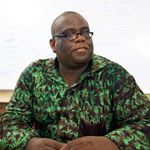BULEEVR Mentorship

Nahid R. Bhadelia, MD, MA
Associate Professor of Medicine, Infectious Diseases, National Emerging Infectious Diseases Laboratories (NEIDL) Boston University School of Medicine
Dr. Nahid Bhadelia is an infectious diseases physician and the medical director of Special Pathogens Unit at Boston Medical Center, which provides care for patients with highly communicable diseases. Furthermore, she oversees the medical response program for BU’s biosafety level 4 program. Dr. Bhadelia is the principal investigator on a large natural history study of COVID-19 patients and the institutional COVID-19 biorepository. In addition, she has provided direct care and implemented response, and medical countermeasures research during Ebola Virus Disease outbreaks in West and East Africa working with World Health Organization and Partners in Health and Department of Defense (DoD). Her research focuses on identification of safe and effective clinical interventions and infection control measures related to viral hemorrhagic fevers and emerging infectious diseases including H1N1, Zika, Lassa fever, Marburg Virus Disease, and COVID-19. Dr. Bhadelia’s expertise has informed several international groups on biodefense priorities, supply chain evaluation, diagnostic positioning, infection control policy development, and healthcare worker training. Dr. Bhadelia is also an Associate Professor at the Institute of Human Security at the Tufts Fletcher School of Law and Diplomacy, where she teaches a course on human security and emerging infectious diseases. Dr. Bhadelia was instrumental in developing the BULEEVR training program.

Jean DeMarco, PhD, MPH
Research Programs Manager – Liberia, University of North Carolina Chapel Hill Institute of Global Health and Infectious Diseases
Dr. DeMarco is the Country Lead and Research Manager for UNC Global Projects clinical research programs in Liberia, with focused research on viral hemorrhagic fevers including the Ebola Virus Disease and Lassa fever. Dr. DeMarco received her PhD in Cellular and Molecular Biology from Penn State University and an MPH in Biomedical Sciences from University at Albany School of Public Health. She has been providing laboratory technical support and biomedical project implementation in Africa for the past 10 years with groups such as USAID, US Peace Corps, and US Universities.
 Mosoka P. Fallah, PhD, MPH, MA
Mosoka P. Fallah, PhD, MPH, MA
President and CEO, Refuge Place International (RPI)
Dr. Fallah has a distinguished record of accomplishment and service to Liberia including but not limited to co-founder and Director General of National Public Health Institute of Liberia, being a leader in the Liberian public health response to 2014/2015 Liberian Ebola outbreak and the recent COVID19 pandemic, with the former being recognized by Time Magazine Persons of Year, 2014, as part of the “Ebola Fighters,” awardee of “Quartz, Builders of Africa Future”, USAID Health Persona and Development Person of the Year. Dr. Fallah has been principal investigator for several NIH-sponsored studies focused on Ebola including PREVAIL. Dr. Fallah has also been instrumental in improving maternal and child health in Liberia and rebuilding the that ravaged post-civil war health system. These efforts include the establishment of Refuge Place International, an internationally recognized maternal and child clinic in the Chicken Soup Factory slum community of Monrovia. Dr. Fallah’s role as an educator is equally accomplished with leadership roles and development of multi-institutional programs for the University of Liberia and A.M. Dogliotti, College of Medicine. Most recently, under Dr. Fallah’s leadership, a Master of Public Health is now offered through University of Liberia. Dr. Fallah’s vision was also instrumental for the BULEEVR training program.

Andrew J. Henderson, PhD
Professor of Medicine (Infectious Diseases) and Microbiology and Assistant Dean of Graduate Medical Sciences, Boston University School of Medicine

Patricia Hibberd, MD, PhD
Chair and Professor of Global Health, Professor of Medicine and Pediatrics, Boston University School of Public Health and Medicine
Dr. Hibberd is a practicing infectious disease consultant who leads a public health, clinical and translational research program focusing on the prevention and treatment of infectious diseases at the extremes of life and improving maternal and child health outcomes. Dr Hibberd’s research includes development and testing of novel point of care diagnostics for infectious diseases and public health, supported by the Bill and Melinda Gates Foundation. She has worked in India for 25 years, funded by NICHD since 2008 and Malawi and The Gambia, in the last 5 years. Dr. Hibberd is also passionate about mentorship and fostering the development of the next generation of global health leaders training more than 60 undergraduate, public health, and medical students, residents, fellows, and junior faculty.
 William Evan Johnson, PhD
William Evan Johnson, PhD
Associate Professor of Medicine and Biostatistics, Boston University School of Medicine
William Johnson specializes in computational biology and biostatistics, developing new tools to investigate disease prognoses and causes and to help determine effective regimens based on individual patients’ risk factors. He has published in the journals Cell, Proceedings of the National Academy of Sciences, Biometrics, Nature Reviews Genetics, Annals of Applied Statistics, and Biostatistics. His work has been funded by the NIH. The focus of his group’s research is to develop computational and statistical tools to investigate core components that contribute to disease prognosis and etiology, and for the accurate determination of optimal diagnostic, prognostic, and therapeutic regimens for individual patients. They are actively developing methods and software tools for data preprocessing, integration, and downstream analysis, and applying these tools in a variety of clinical and biomedical applications.

Laura Skrip, PhD
Disease Modeller, Swiss Tropical and Public Health Institute and Instructor of Biostatistics and Epidemiology, University of Liberia
Dr. Laura Skrip is a quantitative epidemiologist with expertise in mathematical modeling and statistical analysis. She is a Disease Modeller at the Swiss Tropical and Public Health Institute, and in that role, she implements mathematical models with a focus on context-specific strategies to reduce malaria burden. She is also a faculty member at the University of Liberia School of Public Health, where she teaches Biostatistics and Epidemiology and supports efforts to engage students in practicum and thesis opportunities. As a researcher, it is her goal to collaboratively generate evidence that can guide public health decision-making in complex emergencies. During and following her PhD, she has worked extensively with social scientists, clinicians, basic science researchers, and communities to inform mathematical models for quantifying the potential impact of specifically behavior-focused tools and approaches, including risk communication and community engagement. This involved significant field experience to guide policy development in Liberia, the Democratic Republic of the Congo, and Cameroon.

Laura F. White, PhD
Associate Professor of Biostatistics, Boston University School of Public Health
Laura F White an Associate Professor in the Department of Biostatistics at BUSPH and co-director of the PhD and MA programs in Biostatistics. She works as both a collaborative statistician working with multidisciplinary research projects, as well as a statistician doing statistical research developing novel methods to address important problems of public health interest, particularly in infectious diseases. Her research work is focused in developing methods to better quantify infectious disease spread and transmission. Dr. White’s publications include work describing novel statistical methods for estimating important infectious disease transmission parameters. These have been applied to Tuberculosis, Influenza, SARS, Ebola and other person-to-person communicable diseases. She is currently involved in several projects related to SARS-CoV-2, TB modeling and epidemiology, Hepatitis C, HIV/AIDS, and opioid use disorder. Dr. White is also an investigator on the Providence/Boston Center For Aids Research (CFAR) and CHERISH and PI of a NIGMS R01 to develop novel statistical tools to better understand TB transmission and incidence.